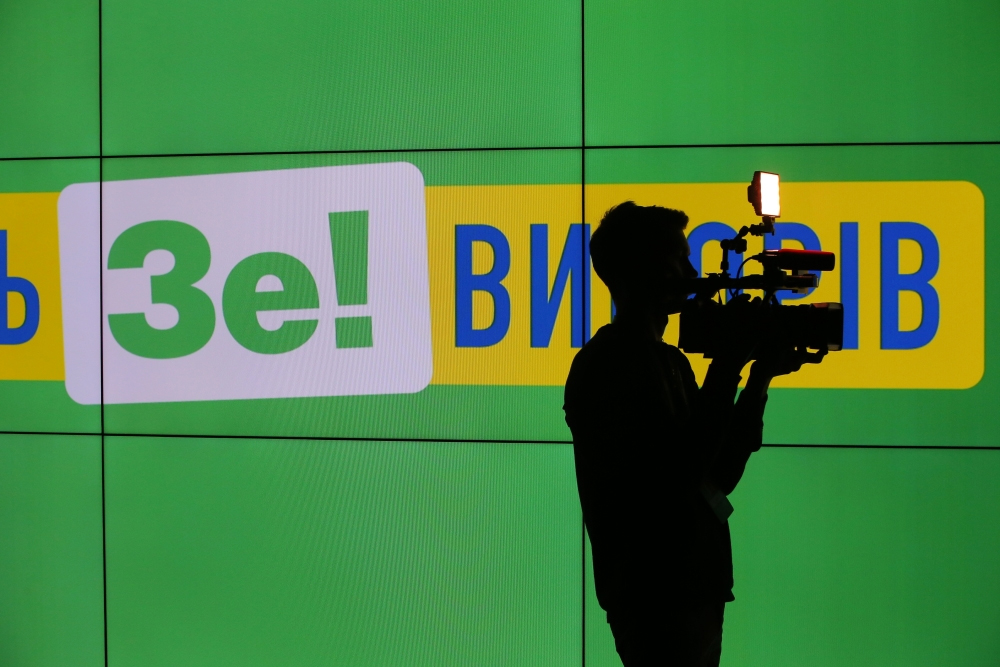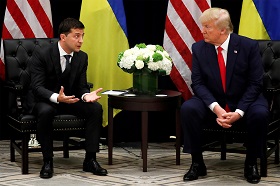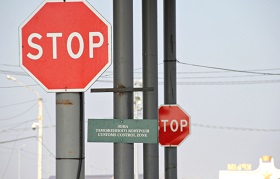The forecast for the Ukraine is one of the most ungrateful tasks for a political expert. The quantity of variables in this equation is so high, that only artificial intellect with plenty of facts and figures uploaded will be able to solve it in the nearest future. The current situation in internal politics and overall in the regional dimension in Europe is so unstable, that the most right forecast will sound like “time will tell”. But the latest formula is not a constructive one.
What issues will be important to look at in 2020 regarding the Ukrainian issue?
First of all — the internal political situation in Ukraine, which have a high probability to change in several months, unless there will be done some serious steps by Vladimir Zelensky and his team. Moreover the position of Zelensky is very sensible towards his international politics and negotiations with USA and Russia, that is why these countries for sure can make their contribution towards the stability of current Ukrainian regime. The statements of Putin and Trump are rather sensitive for the Ukrainian public opinion.
Second — the economic development of Ukraine in 2020 will also depend on its political and social stability. The same relates towards the Ukrainian — Russian gas contracts. Russia is aimed at diversification of gas transit to lower the risks, connected with the high political turbulence in Ukraine.
Finally, regarding the conflict resolution in Donbass, a lot should be done before the process of reintegration starts. Each day while there are the separation of armed forces going on may become the point of bifurcation for the next period of time. If everything goes as prescribed, the 2020 will become a year of developing and implementing conflict resolution strategies and mediating processes.
The forecast for the Ukraine is one of the most ungrateful tasks for a political expert. The quantity of variables in this equation is so high, that only artificial intellect with plenty of facts and figures uploaded will be able to solve it in the nearest future. The current situation in internal politics and overall in the regional dimension in Europe is so unstable, that the most right forecast will sound like “time will tell”. But the latest formula is not a constructive one.
That is why despite the complexity of the situation, it is very useful to depict the potential variants and scenarios of development after each bifurcation point. How we can define these points? What facts and figures we should take into account in our analysis? What are the important point of views in Russian political establishment that should be taken into account?
At least why it is crucial to think of Ukraine now? Since the 2014 Ukraine remains one of the important factors of European and international relations development. It finds the place in each second process, from security to economics. Most of political and expert discussions sooner or later come to the Ukrainian issue. At the same time the Ukrainian interests of themselves sometimes remain on the background of these discussions.
The Ukrainian case is not the only one problem after the collapse of USSR. Nowadays all the post soviet countries are choosing different tracks and pace of development. That is why the attitude towards them should be different, and Europe as well as Russia take it into account. There is no universal politics towards the post soviet countries anymore.
The Russian role in the Donbass conflict — mediator or a part
Recently we have seen several important steps from all the sides towards the conflict regulation. The position of Russia in this case remains the same — the full implementation of Minsk Agreements. But at the same time there are such concrete actions as regular telephone conversations between Vladimir Putin and Volodimir Zelensky, and also some small positive achievements that let us speak about moving from the dead point in this question.
Russian main aim in international politics regarding the Ukraine is to show her capacity as a world power in moderating the violent conflict. Russia consider itself to be one of the mediators, not the part of the Donbass conflict (as it is depicted in Western discourse). For Russia now one of the main task, as well as for the other actors — to move ahead without “loosing the face”, and at the same time to achieve concreet goals.
The Donbass issue is less strategically and politically important for Russia — in any scenario (from violent to an peaceful one) Russia will not loose the game dramatically. For the Ukraine the costs of the current negotiations on Donbass are far more valuable. Crimea is of far more important for Russia strategically and politically, that is why the Ukrainian side now is trying to rise the costs and to combine the Donbass and Crimea issues in the negotiation process.
In general Russia is interested in solving the Donbass conflict for several reasons. One of them is the improvement of its international image — moving from “aggressor” towards a trustworthy and responsible stakeholder. Second, Russia is interested in a more stable situation on its South border. Finally, the Russian population at least on the level of values feel their responsibility for the Russian-speaking “brothers” in Donbas, that is why the stop of violence is highly desirable.
Economy beyond the politics
Ukraine is on the 64th place in the ranking Doing Business. Recently President Zelensky pointed in his speech this as a success. According to the World Bank Ukraine “from 2014 until early 2019, the Government undertook key reforms, including: carrying out significant fiscal consolidation, moving to a flexible exchange rate, reforming energy tariffs and social assistance, enhancing the transparency of public procurement, simplifying business regulations, stabilizing and restructuring the banking sector, moving forward on health and pension reforms, and establishing anti-corruption agencies”.
At the same time there remains the “oligarch” structure of property management and distribution, and in the nearest 2020 the system will for high probability not changed. Russia at one hand don’t have any official and intense contacts with the Ukrainian side, but in the nearest perspective, if the conflict resolution will succeed, the Russian elites will have to find the points of entrance and working contacts in the Ukrainian elites. The negotiations with Medvedchuk in September were such an attempt to find the point of entrance.
The most difficult task for Russian side in this process, is to understand with whom there are prospectives to negotiate, whom they may trust. Taking in consideration this “oligarch” structure of Ukrainian power without one dominant center for capital and power concentration, this country has all the chances to build democracy. M. Olson conception of oligarchy which leads to creation of conditions for forced transactions between several competing power centers tell us [1], that Ukraine has some initial opportunities to build democracy, but not in the way which the Ukrainian civil society wants it to be. The stakeholders in Ukrainian politics need to negotiate in different manner in purpose to make the things done. Perhaps at some time they will come to some kind of internal game rules with the aim of decreasing the transaction costs. At the moment the actors did not recognize the benefits from the common rules, and currently we can observe the ongoing struggle for power and resources, which make the negotiation with Ukraine a very challenging task.
For Russia the vulnurable and turbulent structure of the Ukrainian elite is a real challenge, as the center of power is constantly changing. Keeping in mind that negotiations — is a very costly business, Russia will prefer to have one or two incoming points in Ukraine, but not to find a new one after each change of political spectrum. That is why on a long distance Russia will be interested in developing clear democratic game rules in Ukraine to have the situation in a neighbor country more predictable for lowing the transaction costs.
From the Russian point of view this instability and current turbulence of Ukrainian politics means, that there is no real stakeholder with whom it will be possible to make long living trustworthy cooperation. The interest of Russia in this situation is to have a strong and predictable partner in Ukrainian political elite with whom it will be possible to develop business projects, first of all regarding the gas transit. The current Russian position on Russian gas transit through Ukraine is that there are certain risks if it will be interrupted, as president Putin recently argued, that is why Moscow is open to the dialog on this issue.
The gas negotiations between Russia and Ukraine are also crustal for Europe, as the consumer of Russian gas. Transit of Russian gas through the Ukrainian territory is now on the agenda of negotiations between Russia, Germany and Ukraine. The Europeans hope that “Ukraine’s adoption of the EU energy regulations would remove the risk of further spats and disruptions, creating a stable and flexible legal framework for Russian gas flows to the bloc”. At the same time Russia is also interested in diversification of gas transit and Ukraine insists on the longterm contract. Such a contract will be possible if the partners will see the clear benefits from it and/or will have negotiate in conditions of mutual trust.
In 2020 Russia is highly likely to make attempts to find such a trustworthy and long living partnership in Ukraine if it will be possible. If not — the dialog will be only in some influenced by the USA and EU conditions.
Political games with zero sum — why Ukraine is always seem to loose
The main peculiarity of all the interactions, connected with Ukraine is the high conflict potential of all the process which in result guides to the zero-sum game. Taking into account that sometimes the games between the big international powers are carried without the Ukraine itself, the last is sometimes in the role of a “looser”.
In order to reverse the trend in 2020 and to become a “winner”, Ukraine extremely need to form its own agenda, independent from Western and Russian interests. Vladimir Zelenskys‘ team at a first glance is moving towards this direction of signifying their attitude towards the internal and external politics being adapted for the challenges of the surroundings. That is why Vladimir Putin agreed to hold the telephone negotiations – he has seen the new agenda and some political will in the Zelensky initiatives, as well as a political will for changes.
Moreover we can see the change in official attitude towards the Ukrainian issue in Russia, as Vladimir Putin proposed the Russian media to change their rhetoric towards Ukraine: „We shouldn’t paint our closest neighbor, this fraternal nation … in an unflattering light,“. At the same time Putin would like to have a partner with a strong political will, able to control the internal situation in the country.
In internal politics the Zelenskys‘ team have a very important task — to restore the trust of population towards the political system itself. The ranking of the new president was extremely high at the beginning of his career, and now there is a risk of its declining due to the unpopular peace movement measures. The task is to build this long living trust to the president and to political system in order to carry the necessary reforms.
The efforts of new Ukrainian president in the conflict resolution already put him in a very difficult situation in the internal politics. The adoption of “Steinmeier Formula” cost high political prise in current Ukrainian society, as there are different views on how the conflict must be resolved. And the discourse of Zelensky as a “betrayer” of Ukrainian interests off course damage his internal legitimacy.
After the decision on the Formula a lot should be done — at least the creation of new law on the special status for Donbass region. Zelensky promised to organize a broad discussion within the society on this issue. Anyway it is a long lawmaking process, during which the power should be legitimate. And this will be very hard to achieve, since the opposite voices becomes more and more strong in Ukraine.
The 2020 will be the year of Zelenskys‘ struggle for popular support, as there are already some ideas, that his positions are more and more unstable now. For Russia these are not good news, as the dialog with Zelensky has just started. And in case there are again will be nationalists in power, the dialog will defiantly be postponed for a unpredicted period of time.
The common roots for the Ukrainian society
One of the main idea pronounced by Vladimir Zelensky — is the necessity to integrate the society on values: “Values should be the unifying factor for building a new, strong Ukraine. Values that will unite us for a common future. The values of freedom, democracy, civil society and the rule of law”. Actually this is the continuation of a previous narrative produced by Petro Poroshenko. In this narrative democracy and civil rights are mostly depicted as values.
Values, as the way of evaluating facts as good or bad, are usually changing rather easily, on contrary the everyday practices are more stable. Actually EU are more integrated on practices (the way how the things should be done properly), but not on the values. Taking democracy and the rule of law as values is a way to short term integration but not the fruitful platform for reforms. The region differences and the social polarization in Ukraine still exist. And Ukraine has a long way to go to implement democracy and rule of law in political practices.
Ukraine’s leader does not yet have a clear idea of how Ukrainian society could be consolidated: the differences in people’s perceptions of history and their ideas of the country’s future are too great. Therefore, it would stand to suppose that Zelensky would engage in a balancing act between the interests of Ukrainian people from different regions until he finds an idea that would be understandable and interesting for all.
The border regions in Ukraine are in a risk zone now, as our Western expert colleagues depict in their research. The combatants that return from war in Donbass are not content with the living conditions and cannot find themselves in a peaceful life. So in the conditions of frustration and deprivation, each event may become a trigger point for some protest movements and separatist aspirations.
An important task for new Ukrainian government is to create judicial base for the representation of minority rights in Ukraine. A wide social dialog is extremely needed. The refusal or postpone of this dialog on official political level will make the situation even worse.
For Russia it is very important to be sure that the rights of Russian-speaking population are protected. Despite the aspirations, that the problem of Russian language in Ukraine is exaggerated, for Russian official internal and external discourse this issue remains an important one. It goes side by side with the Russian concept of “Russian World” and soft power, which plays a significant role in the internal politics as well.
* * *
Returning back to the first metaphor of Equation With Many Variables, one should held in mind a lot of aspects to make some comprehensive broadcasts for 2020. What issues will be important to look at in 2020 regarding the Ukrainian issue?
First of all — the internal political situation in Ukraine, which have a high probability to change in several months, unless there will be done some serious steps by Vladimir Zelensky and his team. Moreover the position of Zelensky is very sensible towards his international politics and negotiations with USA and Russia, that is why these countries for sure can make their contribution towards the stability of current Ukrainian regime. The statements of Putin and Trump are rather sensitive for the Ukrainian public opinion.
Second — the economic development of Ukraine in 2020 will also depend on its political and social stability. The same relates towards the Ukrainian — Russian gas contracts. Russia is aimed at diversification of gas transit to lower the risks, connected with the high political turbulence in Ukraine.
Finally, regarding the conflict resolution in Donbas, a lot should be done before the process of reintegration starts. Each day while there are the separation of armed forces going on may become the point of bifurcation for the next period of time. If everything goes as prescribed, the 2020 will become a year of developing and implementing conflict resolution strategies and mediating processes.
First published in the Institutes für Sicherheitspolitik (ISP) website.
1. Olson M. Power and Prosperity: Outgrowing Communist and Capitalist Dictatorships. 1999.







